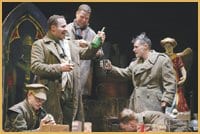When author JK Rowling recently announced at a Carnegie Hall appearance that her Hogwarts headmaster, Albus Dumbledore, was gay, the resulting media frenzy was predictably overblown.
Not since then-vice president Dan Quayle’s chastising of sitcom character Murphy Brown for having an imaginary child out of fictional wedlock had something this juicy dropped into the cable news outlets’ laps. And this was better.
Harry Potter is an international phenomenon and not just a mid-’90s Monday night ratings-winner for CBS. Plus, what’s an unwed mother compared to a gay headmaster of a wizards’ school?
With its under-aged readership exposed to a theoretical mix of teen angst, witchcraft and now homosexuality, the announcement was sure to raise the ire of any number of conservative and religious movements.
This story had legs, and good thing too, considering the war in Iraq was still boring and the California wildfires and Oprah’s all-too-real boarding school troubles were still a week out.
I watched the furor and felt so clearly above it all.
Rowling merely mentioned that she had always thought of Dumbledore as gay, in response to a question from a member of the audience. From my private pundit’s seat, the whole brouhaha signalled how far we still have to go if some inbred Southern Baptist could twist Rowling’s statement into a diatribe against supposed pagan rites of pederasty.
These religious nuts really needed to get a grip, I thought (that, and I wondered if CNN couldn’t find a better spokesperson for us gays than all-round celebrity bottom-feeder Reichen Lehmkuhl).
After all, I would never get so worked up over a fictional character.
And then I went to see The Wars.
A theatrical adaptation of the iconic novel of the same name by gay Canadian author Timothy Findley, The Wars is the story of Robert Ross, a sensitive young man who comes of age surrounded by the horrors of World War I.
The Vancouver premiere, a co-production between Theatre Calgary and Vancouver Playhouse, was a highly anticipated event and promised to be the highlight of the entire theatre season. So it came as no surprise that its leaden pacing and cardboard characters were a huge disappointment.
What was unexpected was the seething anger I felt watching a play that had, to my mind, stripped all gay references from a beloved book. More than just an all-time favourite, The Wars was my Grade 8-sanctioned glimpse into the fact that there were indeed others like me out there.
This time it was personal.
My anger found its focus in playwright Dennis Garnhum, an openly gay man who had worked with Findley —or Tiff as he was known to close friends —on two prior occasions. Having directed both Shadows and The Trials of Ezra Pound at Stratford, Garnhum seemed the perfect person to adapt The Wars on paper.
He looked at The Wars as a continuation of their partnership, one cut short by Findley’s death in June 2002. Twenty minutes into the first act, however, I was ready to string Garnhum up.
As I stirred the cauldron of my discontent, I attributed terms like ‘self-loathing’ and many more unfit for print to the playwright. I blamed Calgary and its homophobia. I railed against the production in print and in private.
Eventually I scheduled an interview with Garnhum, ostensibly to ask him why he gutted the work of a master. At some point during our phone conversation, I saw myself for what I was. God bless me, I was a fanatic.
While I might not have personally liked Garnhum’s choice of included and omitted scenes, there was no revisionist plot to sanitize the stage version. Garnhum pointed out that no less an authority than the author himself had said Robert Ross wasn’t gay.
The sexually graphic scenes weren’t left out due to some Alberta government funding conspiracy; they just didn’t fit into his adaptation, Garnhum explained. Their loss, he added, was certainly balanced out by a delicate quasi-love story he had expanded upon between the main character and Harris, a sweet boy from Cape Breton.
“A different person would adapt this very differently,” Garnhum continued. “I have worked very closely and intensely on this project for four years and I hate to pull the Tiff card but we were a really good match for each other. I feel very confident that Tiff would have approved of this production.”
I still may disagree with Garnhum’s creative choices. I probably always will. But I must concede that his pedigree, motives and methodology are beyond reproach.
In the end, my anger was directed at myself. Just like that preacher who accused Dumbledore of sodomizing preschoolers on the lawn of the Arkansas State Capital, I had constructed my own comfortable interpretation of The Wars and was ready to fight anyone with a different viewpoint. In my quest for freedom and fairness, I lost both.

 Why you can trust Xtra
Why you can trust Xtra


